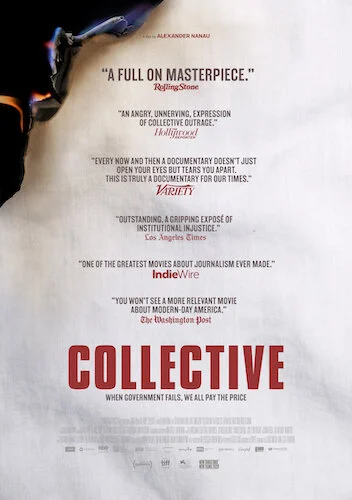Collective
Written by Andreas Babiolakis
We are playing catch up by reviewing films that are a part of the current awards season.
Some documentaries follow such a cookie-cutter formula. You get your interviews in a row. You concoct a story of sorts. You have linearity. Somehow, this same medium can feel entirely uncontrollable, as if you have latched onto some sort of a cheetah that has sped off, and you have no idea as to where it will go. Documentaries of this nature are usually the most affective ones, because you no longer feel like someone is trying to tell you something. You live these experiences, images, confessions, and revelations. This is exactly how Collective feels, and it’s actually frightening how much the film sprints. At times, I found myself forgetting this even was a documentary, and then quickly wishing that it was just a fictional feature, given how disturbing its subject matter is. Collective feels just like a great journalistic thriller, but it’s all far too real, and what atrocities it unveils continue to sicken me weeks later.
I could be wrong, but it almost felt like Collective was made for a completely different reason in its infant stages. The club Colectiv (where the film gets its name) was burned to the ground in late 2015, and claimed twenty seven lives (with nearly two hundred additional injured patrons); of these initial survivors, three dozen more people died because of continued neglect within the hospital and health care systems. That is where the real story comes in, and you can see where the clear change in focal point comes in. This is no longer just about what happened at Colectiv, but what didn’t happen afterwards. Like a dog on a scent, Collective begins to bolt into another direction and follow this bad news, only for the film to pick up on so many criminal details that have been hidden from the public eye. Of course, this happens in Romania (Colectiv was a Bucharest club), but you can only imagine what’s really going on everywhere.
The longer Collective goes on, the more unreal its revelations become.
The journalists at the heart of this film (led by writer Cătălin Tolontan) are set on finding out more, and doing whatever it takes to getting to the truth. There are so many uncomfortable confrontations, and Collective is prepared to share them all (much can be discovered when the chips are down). It’s obvious to state that there are lies upon lies that get questioned, but it’s about what these lies are that really got to me. It’s the evidence that — to some (especially those in power) — the healthcare system is a business before it is a service to genuinely help people: something we all know is true but don’t really want to admit. Even with the best people in these professions, the ways they are operated are still backward, and beneficial to those that profit off of the sick first. Like many of us, these journalists are fed up as well. What was meant to be the following-up of a tragic event becomes a hunt to the source of corruption, as if we’re now a part of a near-espionage adventure.
In case the nerve wracking revelations weren’t enough, Collective also has an artistic spirit, and uses that to round out this otherwise purely-nauseating affair. One such instance runs throughout the film, and features survivor Tedy Ursuleanu, who takes part in a photoshoot somewhere in the middle of the film. Her images are then hanged up in the offices of the journalists while they continue to fight for the voiceless. This shoot is exquisite, and Ursuleanu becomes the face of many who have faced both unfortunate disasters and the brunt end of poorly run facilities; these facilities where money comes first, thinking differently will cost you, bacterial infections can creep in at any time, and the safety of the general population isn’t important.
The photoshoot at the centre of the film is extremely memorable, for being a moment of grace amongst all of the difficult discoveries.
By the end of the film, I didn’t want this to be factual. There’s no way. How could a facility, an industry, or an entire government just not care? Then I remembered that this isn’t exactly news. This happens all of the time, in every place, but in different ways. When a COVID-19 vaccination rollout can be disrupted by a climate plan focused on carbon emissions, that’s when you know the immediate urgency to save people just doesn’t matter. This is only one relatable instance out of a countless pile. Collective can only devote so much time to spelling it out for you, but it does just enough to remind you that this is entirely possible (and likely). I don’t bring this up to turn everyone into conspiracy theorists, of course (I’m not one myself). A film like Collective just gets me going, because these monstrosities are often staring us in the face. If a picture like Collective is how we can face facts, then so be it.
Andreas Babiolakis has a Masters degree in Film and Photography Preservation and Collections Management from Ryerson University, as well as a Bachelors degree in Cinema Studies from York University. His favourite times of year are the Criterion Collection flash sales and the annual Toronto International Film Festival.








